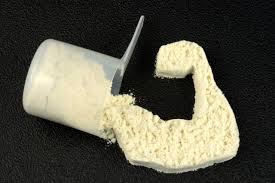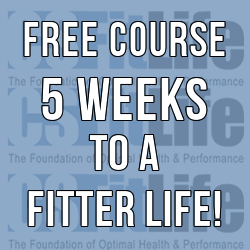Over the next few weeks, we are going to look at nutritional supplements and how they can benefit us in and out of the gym. This isn’t an exhaustive series by any means. These are the staple supplements.
Keep in mind that nutritional supplements are just that: supplements to your diet. If you eat at the golden arches on the regular, sleep with the mentality of “I can rest when I am dead”, and don’t manage stress well, you are literally crapping and pissing your money away on supplements. Nail nutrition, sleep, and stress management down first and then you may want to consider supplements to help achieve your goals.
Also, if you don’t care about the “why” and just want the cliff notes, I will include a “Key Points” section at the start of each article and a “My Take” section at the end.
So let’s geek out and start with protein and protein powders.
Key Points:
- Consuming adequate amounts of protein is necessary to recover from training sessions and to gain muscle or get faster and stronger.
- Those who exercise should consider protein intakes of .72 – .91 grams/lb of bodyweight per day. This is 109 – 136 grams of protein for a 150lb individual.
- Using protein powders can be an efficient way to meet the recommended amounts of protein.
- Pre- and post-workout nutrition is key! At a minimum, consider consuming 20-30 grams of whey protein about 30 minutes pre-workout and 20-40 grams of a blended protein (i.e. whey, casein, etc) within 30 minutes of finishing your training session.
- Consume 20-40 grams of fast digesting carbs (dextrose, waxy maize, etc.) along with the post-workout protein.
Protein! What is good for?
Whether we get protein from meats, plants, or supplements, an adequate supply is vital. Proteins are made up of amino acids which are an important component of every cell in the body. Protein plays an important role in hormone formation, enzyme and immune function, and the transportation other proteins.
Of interest to us is that when we train, we break tissue down and cause tons of damage to our bodies. We go home, eat and rest. That’s when we get stronger, faster, leaner, more muscular and more powerful!
Our bodies use protein to build and repair all the damage we inflicted. So, whether you want your squat or snatch to go up or mile or 10k time to go down, you have train and cause damage, go home rest and repair and repeat this process over time.
For all of this to occur, we must keep our protein levels topped off. However, since our bodies don’t store protein in the same manner as fat and carbs, keeping our levels topped off is like trying to keep a sink full without a drain plug. Protein is constantly used and needs to be replenished. If not replenished, our bodies can start to cannibalize itself. That means all that hard earned muscle for the bigger snatch and squat or the faster run is eaten away. Left unattended long enough, things get even worse and vital functions can shut down.[i]
Okay… So how much protein?
The recommended daily allowance (RDA) is 0.8 grams/kg of body mass. For a 150lb individual, that is about 55 grams per day. Two things should be noted. First, this is the amount that is recommended for sedentary, healthy adults. Those who exercise where not considered in the recommendation. Second, this is the rock bottom minimum amount to keep crap from going haywire and shutting down.
If you do more than set on the couch, eat ho-ho’s and watch the paternity tests on Maury, then you need more than the RDA!
A 2007 paper[ii] by the International Society of Sports Nutrition (ISSN) determined several key points that are of interest to us:
- Those who exercise need more than the RDA.
- The amount protein we need is between 1.4-2.0 grams/kg of bodyweight per day which is between 95 and 136 grams for a 150lb individual.
- The increased amount is safe in active, healthy adults and does not cause damage to the kidneys.
- Supplemental protein is a practical way to get the necessary amounts of protein.
In reference to those who exercise, the ISSN paper above stated that “there is a genuine risk in consuming insufficient amounts of protein, especially in the context of exercise; a negative nitrogen balance will likely be created, leading to increased catabolism and impaired recovery from exercise.”
Translation: All that work in the gym, road, or track is gone!
These findings are nothing new. When working with bodybuilding and fitness athletes, I have suggested daily protein intake in the range of 1.5-3.3 grams/kg of bodyweight. Additionally, besides those of us who regularly train, individuals on low calorie and/or low carb diets may benefit from the higher intake.
Dr. Jim Stoppani, a leading expert in nutritional supplementation, recommends between 2.2 and 4.4 grams/kg of bodyweight. For the 150lb individual, this equals 150-300 grams per day.[iii]
For endurance athletes, the recommended range is 1.0 – 1.6 grams/kg of bodyweight. This is between 68 and 109 grams for a 150lb individual. As duration and intensity increase, so does the protein requirement. For strength/power athletes like those who do CrossFit, the range is 1.6 – 2.0 grams/kg of bodyweight or 109 to 136 grams for a 150lb individual. The ISSN recommends the upper end of the range.[iv]
Supplemental Protein…
Obviously, whole foods should provide the majority of the protein we ingest. There are other macro- and micro-nutrients found in whole foods that can’t be supplemented easily. However, there are times that supplemental protein may be appropriate.
First, some people don’t like the taste or texture of meat, don’t have large appetites, or have moral or religious reasons for not being able to get adequate amounts of protein. If you are on a plant based diet or just generally struggle to eat enough protein for other reasons, supplementing with protein can bump the totals up!
Second, research has shown that that consuming small, mixed meals (i.e. protein, carbs, and fats) before and/or following strength training can help with gains in muscle mass and strength. However, not just any type of protein will do. The source (chicken, red meat, whey, casein, etc) matters too![v] More on that in a moment…
The key to remember is that supplemental protein can help increase our daily totals and help us recover from training sessions. For the biggest bang, consume protein pre- and post-workout.
Now, if you are like me, I don’t want to train with a full stomach and I don’t feel like eating a sweet potato and chicken breast as soon as I finish. So, what do you do?
Enter Protein Powders!
Protein powders are dietary supplements that contain a high percentage of protein. This protein can be derived from milk, eggs, soy, rice, pea, hemp, etc.
For me, around training, I stick with milk protein. There are main two types of milk protein: whey and casein. Whey protein is a faster digesting protein whereas casein is a slower digesting protein. There is conflicting research for the best type of protein to take prior to and following training; however, evidence is growing that suggests taking a blended protein might be best.[vi]
According to the ISSN, the type and quality of the protein “is of greatest importance when planning a regimen of pre- and post-exercise protein ingestion.”[vii] The ISSN recommends “that the protein contain both whey and casein components due to their high protein digestibility corrected amino acid score and ability to increase muscle protein accretion.”[viii]
Dr. Stoppani, recommends taking 20 grams of whey or a blended protein pre-workout and 20-30 grams of whey or a blended protein post-workout. His original recommendations included 20-30 grams of whey plus 10-20 grams of casein post-workout. Recent research suggests that a combo of 25% whey (fast digesting), 50% casein (slow digesting), and 25% soy (medium digesting) may be the optimal combo.[ix] Dr. Stoppani has updated his original recommendations to reflect the new research.
One last thing…
While this article is geared at discussing protein, I would not do you service if we don’t discuss post-workout carbs. Consuming carbs, particularly fast digesting carbs, post-workout is beneficial for two reasons.
First, when we perform high intensity workouts (like CrossFit), we rely heavily on glycogen (stored carbs) as fuel. By the end of the workout, our stores are diminished. So, we need to top them off.
Second, taking fast digesting carbs post-workout causes a spike in insulin that can help with nutrient uptake and speed recovery.
The amount of carbs to take post-workout varies based on bodyweight, the training session, and goals. However, Dr. Stoppani recommends 20-40 grams within 30 minutes of finishing training.[x]
My Take…
Obviously, if we are going to make gains in the gym, we have to take care of our bodies outside of the gym. Based on the research, supplementing with whey or blended proteins pre- and post-workout is ideal. While the exact amounts are individual, a good starting point is:
- Consume 20-30 grams of whey protein about 30 minutes pre-workout.
- Consume another 20-30 grams of whey plus 10-20 grams of casein immediately following the training session. You may also want to consider the whey, casein, soy blend mentioned above.
- Consume 20-40 grams of fast digesting carbs (dextrose, waxy maize, etc.) along with the post-workout protein.
- Ideally, the post-workout protein and carbs would be consumed within 30 minutes finishing training.
If you are interested in finding specific protein powders to meet your needs, email me at steven@csfitlife.net.
[i] Berardi, John, and Ryan Andrews. “Macronutrients.” The Essentials of Sport and Exercise Nutrition. 2nd ed. Precision Nutrition, 2015. 162. Print.
[ii] Campbell, Bill, Richard Kreider, Tim Ziegenfuss, Paul La Bounty, Mike Roberts, Darren Burke, Jamie Landis, Hector Lopez, and Jose Antonio. “International Society of Sports Nutrition Position Stand: Protein and Exercise.” Journal of the International Society of Sports Nutrition 4.8 (2007). Journal of the International Societ of Sports Nutrition. Web. 3 May 2015. <http://www.jissn.com/content/4/1/8>.
[iii] Stoppani, Jim. “Nutrition Research Update February 1, 2013.” Jimstoppani.com. 1 Feb. 2013. Web. 4 May 2015. <http://www.jimstoppani.com/home/articles/nutrition-research-update-february-1>.
[iv] Ibid., 4
[v] Lemon, Peter, John Berardi, and Eric Noreen. “The Role of Protein and Amino Acid Supplements in the Athlete’s Diet: Does Type or Timing of Ingestion Matter?” Current Sports Medicine Reports 4 (2002): 214-21. Print.
[vi] The Role of Protein and Amino Acid Supplements in the Athlete’s Diet: Does Type or Timing of Ingestion Matter?, 6
[vii] International Society of Sports Nutrition Position Stand: Protein and Exercise, 6
[viii]Ibid, 7
[ix] Reidy, P. T., et al. Protein Blend Ingestion Following Resistance Exercise Promotes Human Muscle Protein Synthesis. Journal of Nutrition 143(4):410-416, 2013.
[x] Stoppani, Jim. “JIM’S MUSCLE-BUILDING NUTRITION RULES.” Jimstoppani.com. 18 June 2013. Web. 4 May 2015. <http://www.jimstoppani.com/home/articles/jims-updated-muscle-building-nutrition>.


